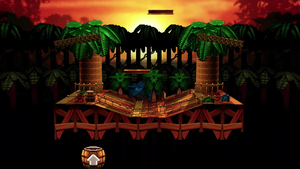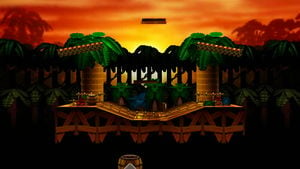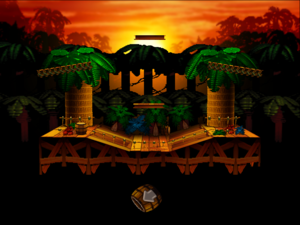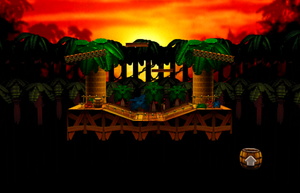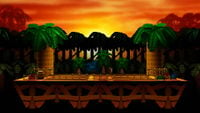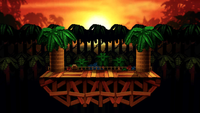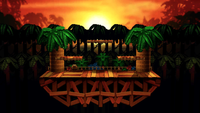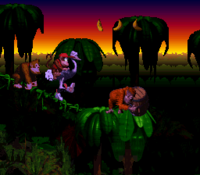Kongo Jungle
| Donkey Kong Country Kongo Jungle Kongo Jungle 64 Congo Jungle | |
|---|---|
Kongo Jungle in the Smash games. | |
| Universe | Donkey Kong |
| Appears in | SSB Melee SSB4 (Wii U) Ultimate |
| Availability | Starter (SSB and Ultimate) Unlockable (Melee and SSB4) |
| Unlock criteria | Complete 15-Minute Melee (Melee) Clear The Original Heavyweights event (SSB4) |
| Crate type | Normal |
| Maximum players | 8 |
| Article on Super Mario Wiki | Kongo Jungle |
| “ | The moving barrel beneath the stage could be your salvation if you get knocked off. | ” |
| —Super Smash Bros's instruction manual | ||
Kongo Jungle (コンゴジャングル, Kongo Jungle) is a stage in Super Smash Bros. (originally spelled Congo Jungle) that reappears in Super Smash Bros. Melee (as Past Stages: Kongo Jungle on the stage select screen and as Kongo Jungle N64 in Random Stage switch), Super Smash Bros. for Wii U (as Kongo Jungle 64 in NTSC versions and Kongo Jungle (64) in PAL versions), and Super Smash Bros. Ultimate. It is also Donkey Kong's home stage, as well as the 6th stage of 1P Game, where Donkey Kong is fought in the form of Giant Donkey Kong.
Stage overview[edit]
The players battle in a jungle at sunset, which is a combination of jungle levels from the Donkey Kong County series. This stage is made up of a main large indented platform. Two slanted soft platforms float over its sides, and in the middle two more small soft platforms spin clockwise in a circle. The main platform can be passed through from below, but not from above.
A Barrel Cannon moves back and forth under the stage, spinning. A player who enters the cannon is shot in the direction the cannon is pointing either by pressing a button, or automatically after a while: this can greatly aid recovery, but it can also shoot players offscreen. The barrel can hold only one character at a time.
In Super Smash Bros. Melee, the stage itself is a near-exact copy of the SSB version, only being slightly larger. There also seems to be a short delay when the player is launched from the barrel, which makes it riskier to use.
In Super Smash Bros. for Wii U, like other returning stages from the first Smash game, some of the textures are slightly higher in quality, but the overall primitive look of the original is retained.
In Super Smash Bros. Ultimate, the stage's notoriously large blast zones have been moved inwards somewhat. Turning stage hazards off will keep the moving platforms in one place and remove the barrel cannon.
Ω forms and Battlefield form[edit]
In Super Smash Bros. for Wii U, the main platform of the Ω form is completely flat. The barrel cannon and soft platforms don't appear, and the main platform cannot be passed through from below.
In Super Smash Bros. Ultimate, the Ω form and Battlefield form are similar to SSB4's Ω form; however, they are resized and reshaped to match Final Destination and Battlefield, respectively. The three soft platforms of the Battlefield form somewhat resemble the ones of the normal form.
Origin[edit]
This stage is loosely based on the various jungle themed levels of Donkey Kong Country, such as the ones in Kongo Jungle, the first world featured in the game. The stage and its gradient background is likely based on Orang-utan Gang, a jungle level in the game's third world, Vine Valley, which features a sunset gradient in the background.
Barrel Cannons are a type of Barrel in the Donkey Kong Country series that will shoot out the Kongs towards the pointed direction and sometimes move sideways. In Donkey Kong Country, the Barrel Cannons will either shoot the player automatically or with the push of a button. In Donkey Kong Country 2: Diddy's Kong Quest, Barrel Cannons are added with an arrow to indicate the direction the arrow it pointing; however, unlike in Donkey Kong Country and this stage, the arrow Barrel Cannons in Donkey Kong Country 2 remain stationary. One of the plain barrels can be seen discarded on the stage foreground
The base platform's shape evokes the almost-entirely sloped terrain in the Jungle Hijinxs levels of Donkey Kong Country, while the base platform and moving platforms' texture bears a resemblance to Lakeside Limbo from Donkey Kong Country 3: Dixie Kong's Double Trouble!, which was also made of planks of alternating shades. The upmost soft platforms of the stage don't resemble anything from the Donkey Kong Country series, which avoided abstract floating platforms in favor of natural environment pieces, though they are held together by green vines, which were featured in the bramble levels of Donkey Kong Country 2 and the Jump Board Scene stage of Donkey Kong Jr.
A flock of Neckies, a type of vulture enemy from Donkey Kong Country, appear as background characters.
Tournament legality[edit]
Super Smash Bros.[edit]
Kongo Jungle was usually considered to be a counterpick stage in doubles, but is banned in the US national ruleset in singles, as with every other previously legal stage besides Dream Land.
The stage's layout does not provide a significant disadvantage for any character, although the slanted structure can worsen certain characters' horizontal combos, such as Yoshi. The Barrel Cannon below may be considered a gimmick, but it is very easy to punish players shooting upwards out of the barrel, and it is also impossible to stall indefinitely in the barrel. However, there were some arguments that circle camping could be a potential problem and that could lead to an eventual ban. It was a rarely played stage, and it was seen the least in tournaments, even if it was more neutral than the one counterpick stage at the time, Peach's Castle. In doubles, though, the stage was much more commonly picked and was generally seen as quite neutral.
In the Japanese ruleset, Kongo Jungle has always been banned. However, no definite reason has been given as to why, outside of potential circle camping due to the platforms being too high for certain characters.
On this stage, certain palette swaps are banned from being used due to the darkness of the stage's background; namely Captain Falcon's black palette swap, Donkey Kong's black palette swap, and Samus's brown palette swap.
Super Smash Bros. Melee[edit]
Kongo Jungle was usually regarded at first to be a counterpick. Although it had a relatively non-obtrusive stage design, it had a large size, which gave an advantage to faster characters and characters with projectiles, as well as a high ceiling, giving a slightly larger reliance on horizontal finishers. However, the stage is currently banned in singles, since characters such as Peach and Jigglypuff were found to be very powerful on the stage, as the platform layout made it extremely difficult to approach floaty characters circle camping across the two top platforms. A match between Pink Shinobi and RockCrock at GENESIS is particularly infamous, and commonly regarded as one of the primary reasons why the stage was banned. The stage initially remained a counterpick in doubles due to the 4-character gameplay removing the camping disadvantages, but the stage was seldom picked in tournaments, so much so that it has been phased out of stage selection for doubles tournaments altogether.
Super Smash Bros. 4[edit]
Kongo Jungle was never included in any mainstream rulesets for Smash 4. The stage remains largely the same in terms of function and layout, albeit with smaller blast zones. However, characters launched from the barrel now have a hitbox, unlike in previous games, making it a more concerning damaging hazard. Additionally, characters with good aerial mobility remain able to circle camp the upper two platforms, making it a less-than-ideal candidate for stage legality.
Super Smash Bros. Ultimate[edit]
Kongo Jungle remains universally banned. Although disabling stage hazards removes the barrel cannon, eliminating a potentially intrusive element from the stage, the moving platforms remain stationary near the same height as the upper platforms, further encouraging circle camping by removing an already-limited route to reach the upper two platforms.
Video[edit]
Gallery[edit]
Super Smash Bros.[edit]
Super Smash Bros. for Wii U[edit]
Names in other languages[edit]
Trivia[edit]
- This stage has had a different name in every appearance. In Super Smash Bros., it is called "Congo Jungle"; in Melee, it is called "Past Stages: Kongo Jungle" on the stage select screen and "Kongo Jungle N64" in the Random Stage switch; in Smash 4, it is called "Kongo Jungle 64" in NTSC versions and "Kongo Jungle (64)" in PAL versions; and in Ultimate it is simply called "Kongo Jungle".
- In Smash 4, this stage's Spanish name makes no mention of its appearance in the Nintendo 64 game, being named Jungla Kong (Kong Jungle) in PAL versions and Selva Kongo (Kongo Jungle) in NTSC versions without any "64" suffix.
- When hazards are turned off in Ultimate, the right platform of the 2 in the middle is slightly higher up than the left one.
- In Super Smash Bros. 4, this stage's song's intro was slightly edited, possibly because it was originally too long, and it fit with the original on-screen appearance that was in the original Smash 64. This change was carried over into Ultimate.
- The misspelling "Congo" in this stage's first outing might be due to the fact that two countries in Africa, as well as a river that runs through them, are spelled "Congo", whereas the location in Donkey Kong Country, which this stage's name is attributed to, is actually called "Kongo Jungle", a pun between "Congo" and "Kong".
- In SSB4, this is the only Smash 64 stage exclusive to Smash Wii U as it is also the only Smash 64 stage that isn't downloadable content.
- It is also the only Smash 64 stage in Smash 4 that doesn't have "64" in parentheses (only in the NTSC region).
- In Ultimate, Nikki cannot be summoned on this stage, due to the fact that the dark background would make her drawings difficult to see. Additionally, the Squid Sisters and Marshadow cannot be summoned here either.
| Stages in Super Smash Bros. | |
|---|---|
| Starter stages | Congo Jungle · Dream Land · Hyrule Castle · Peach's Castle · Planet Zebes · Saffron City · Sector Z · Yoshi's Island |
| Unlockable stage | Mushroom Kingdom |
| Stages in Super Smash Bros. Melee | |
|---|---|
| Starter stages | Brinstar · Corneria · Fountain of Dreams · Great Bay · Green Greens · Icicle Mountain · Jungle Japes · Kongo Jungle · Mushroom Kingdom · Mute City · Onett · Pokémon Stadium · Princess Peach's Castle · Rainbow Cruise · Temple · Venom · Yoshi's Island · Yoshi's Story |
| Unlockable stages | Battlefield · Big Blue · Brinstar Depths · Final Destination · Flat Zone · Fourside · Mushroom Kingdom II · Poké Floats |
| Dream Land · Kongo Jungle · Yoshi's Island | |
|
| |
|---|---|
| Fighters | Donkey Kong (SSB · SSBM · SSBB · SSB4 · SSBU) · Diddy Kong (SSBB · SSB4 · SSBU) · King K. Rool (SSBU) |
| Assist Trophy | Klaptrap |
| Boss | Giant Donkey Kong |
| Stages | Kongo Jungle · Kongo Falls · Jungle Japes · Rumble Falls · 75m · Jungle Hijinxs |
| Items | Hammer · Barrel Cannon · Peanut · Spring |
| Enemies | Kritter · Tiki Buzz |
| Other | Dixie Kong · DK Barrel · DK Island · Pauline · Stanley · Zinger |
| Trophies, Stickers and Spirits | Trophies (SSBM · SSBB · SSB4) · Stickers · Spirits |
| Music | Brawl · SSB4 · Ultimate |
| Masterpiece | Donkey Kong |
| Related content | Mario (universe) · Banjo · Barrel |
